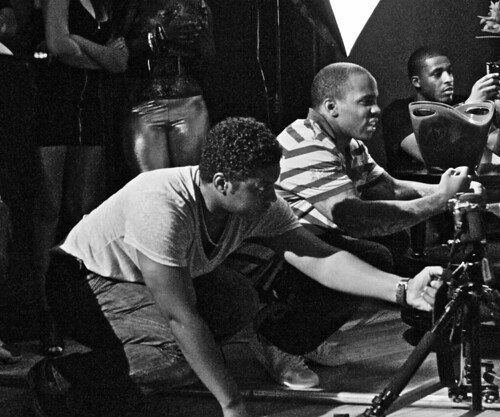After leaving the football team last season, former player Lamar McPherson started his own production company.
Coming out of high school, almost every football player thinks he has what it takes to make it to the National Football League. For most, the thought is nothing more than a pipe dream.
According to the NFL Player’s Association, of more than 100,000 high school seniors who play football, only 215 – approximately two-tenths of 1 percent – make it to the NFL. The rest, like former football player Lamar McPherson, find their calling in other professions.
McPherson came to Temple after he redshirted for a year at Syracuse. At the time, coach Al Golden was entering his first year on North Broad Street, and the program was coming off a winless season. McPherson, who was ranked the 55th best athlete in his high school class by Rivals.com, was one of the bigger-named prospects of Golden’s first recruiting class. McPherson would go on to see significant time at three different positions during his time with the Owls, but he did not accomplish enough on the field to be seen as a legitimate pro prospect.
After he played the last game of his career at the EagleBank Bowl in December, McPherson thought about his next course of action and made his decision. With football behind him, he pursued his other passion: filmmaking.

McPherson had been producing clips during his spare time since his junior year. The clips ranged from a documentary on teammate Omar McDonnaugh-Hales’ struggles as a single father to rap music videos. McPherson’s work was out there, but he wasn’t getting enough exposure to turn his hobby into a career.
An opportunity arose for McPherson in the form of the School of Communications and Theater’s Los Angeles summer internship program, an arrangement that sends students to L.A. and sets them up with companies there for two months to make connections in the entertainment industry. After he finished his initial time in L.A., McPherson extended his stay. His decision had a lot to do with the opportunities the West Coast provided, McPherson said.
“Once I got out to L.A., it was a land of opportunities,” McPherson said. “I didn’t see the industry in Philly being as big as it is in L.A. In L.A., it’s work and grind all day.”
McPherson said when he first started making music videos, it required a lot of self-promotion and sacrifice. Often, he would agree to make a video and lose money through its production. But the connections McPherson made, he said, were worth the losses.
“When I first started doing music videos, I was by myself,” McPherson said. “I knew what it would pay off. It might have been like, ‘Yeah, I’m doing this job, and I’m not making $1,500, but I don’t have that name yet.’ Then I went out to L.A., and I got with more people and started making some good money.”
“Look, I saw what coach Golden did at Temple from the beginning,” McPherson added. “People see now that the program is doing well, but coach Golden knew what the outcome was going to be from the first day he got hired. He believed in it. That’s what I’m doing now.”
McPherson eventually started M Vision Productions, a company that focuses primarily on making music videos and behind-the-scene clips. Since he entered the industry, McPherson has worked with artists such as Nicki Minaj, Lil’ Kim, Wacka Flocka Flame and Ape Gang. While McPherson has spent the majority of his time behind the camera, that hasn’t stopped him from appearing on the screen as well. One of the more defining moments of his career so far, he said, was acting in an E-40 music video that featured Snoop Dogg, an opportunity that came by chance.
After McPherson took a position as a personal assistant to Snoop Dogg during the shooting of “Can’t Stop the Boss,” he noticed the actors who were cast as S.W.A.T. officers were smaller than he thought they should be for the role. McPherson approached the producer, explained his past in football and asked if there was a role for him. He was given the role of the last S.W.A.T. officer, a small role he would make bigger by relying on a philosophy he learned at Temple.
“During one of the shoots, we had to go through this back kitchen, and it was my turn to go through the door, and as I walked through the door, I kind of did it soft,” McPherson said. “On the next take, I kicked the door open and it came off the hinges. The director yelled, ‘Cut,’ and asked who I was. From then on, I was the lead S.W.A.T. guy.”
“That’s how things work in Los Angeles,” McPherson added. “You have to be ready at all times. Coach Golden taught us to always flip the switch. That’s something I learned from football. If you get an opportunity, you have to be ready to flip the switch. If you don’t do it, somebody else might jump on that opportunity.”
As his career progresses and he moves toward his goal of eventually directing feature-length films and documentaries, McPherson said he plans to rely heavily on what he learned from Golden.
“I think I needed [Golden] more for my life off the field than I did for my life on the field,” McPherson said. “He contributed so much to me. I needed him as a mentor. What he taught me has taken me a long way in a short amount of time. I’m just trying to be humble and just keep doing my work. You get a lot of that from Temple.”
Kyle Gauss can be reached at kyle.gauss@temple.edu.


Be the first to comment